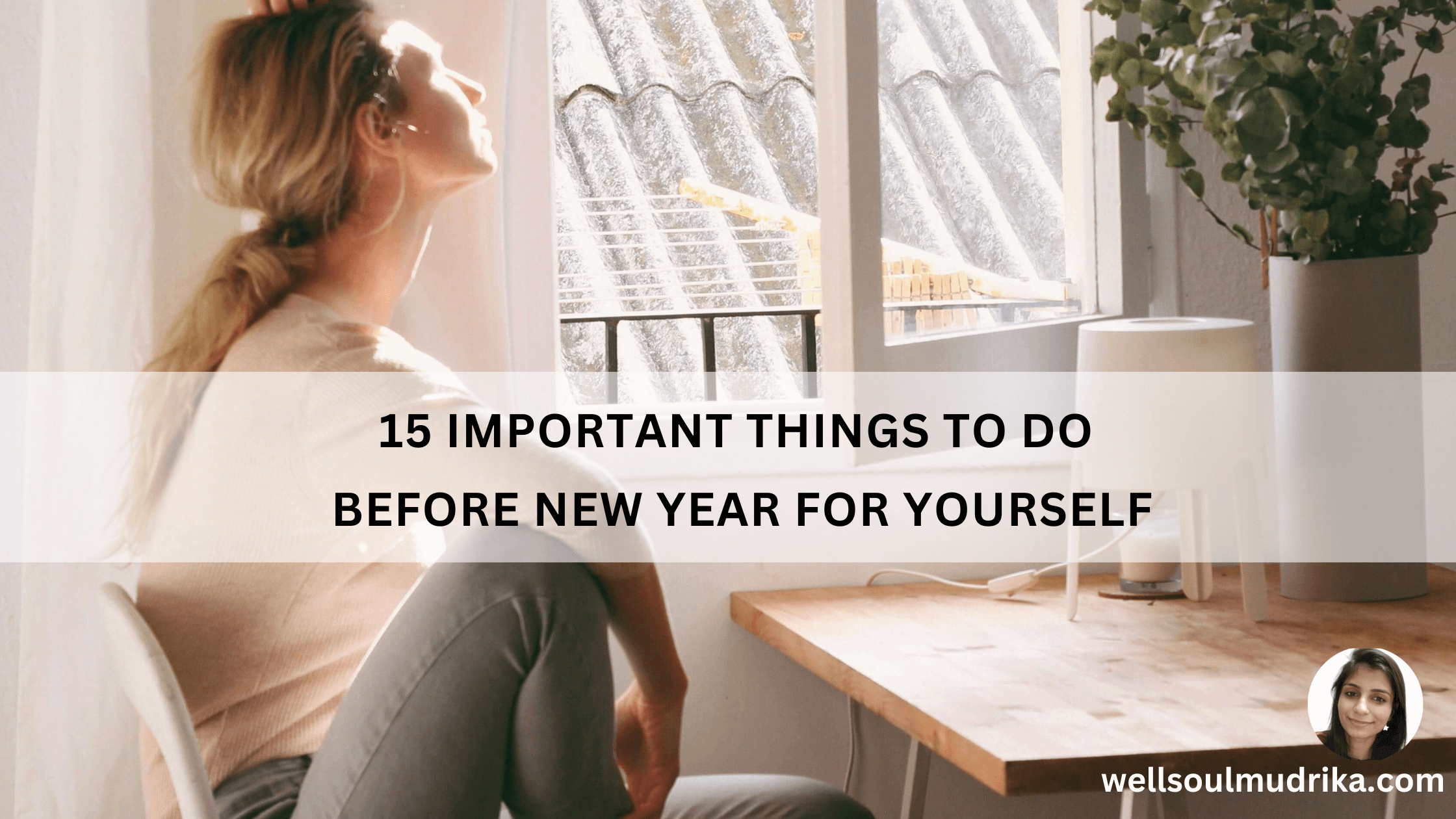Nurture your well-being with the 7 types of self-care. Get practical tips and a daily self-care plan for a healthier, balanced, and happier life.

It was 3:00 AM on a Wednesday when I realized I hadn’t eaten properly, and I had pushed my body and mind to their limits.
I was bent over my laptop, eyes burning from the screen’s glow, surviving on coffee and the promise that I’d “take care of myself tomorrow.” Sound familiar?
We live in a world that celebrates the grind, where “busy” has become a badge of honor. Technology promised to make life easier, but instead made everything faster. Now we’re expected to be available 24/7 and keep up with an impossible pace.
Maybe you’re juggling work, projects, relationships, and family, constantly pushing yourself to do more. In this rush, someone gets lost: YOU.
That night, staring at my reflection, I saw someone who had confused self-neglect with productivity. Someone who had forgotten that caring for yourself isn’t selfish, but essential.
So, here’s the thing. Self-care is so much more than the pretty, Pinterest-perfect moments.
In this post, we will learn all about self-care, the 7 types of self-care, and barriers to our self-care journey. I’ll share what I’ve learned both from science and my own messy, beautiful journey. Because you deserve to feel whole. You deserve self-care.
What is Self-Care?
Self-care is any intentional action we take to preserve or improve our health and well-being. In other words, it’s the things you do for yourself that you truly deserve.
According to the World Health Organization (WHO), self-care is “the ability of individuals, families and communities to promote their own health, prevent disease, and maintain health…with or without the support of a health or care worker.”
But beyond definitions, research, and types of self-care, it is deeply personal.
It’s about listening to yourself and genuinely showing up for yourself in meaningful, everyday ways that nourish your mind, body, and soul.
Why is Self-Care Important: The Science-Backed Benefits
Practically everyone feels the strain of modern life, and neglecting self-care can take a serious toll on your health. Those long workdays and one-off neglects eventually become an unhealthy habit.
The WHO recognizes burnout as a work-related syndrome caused by chronic, unmanaged stress. Symptoms include feeling exhausted, mentally distant from work, and less effective, essentially the opposite of what we want in our lives.
By contrast, as per a study, making self-care a priority builds personal resilience and significantly lowers levels of burnout and emotional exhaustion.
Self-care is also crucial for mental health. The NIH explains that taking care of your emotional and physical needs can help you manage stress, lower your risk of illness, and give you more energy. It can even support recovery if you’re already dealing with a mental health challenge.
So, if you are feeling physically, mentally, or emotionally exhausted, you need to give importance to your self-care.
Think of self-care as the oxygen mask on an airplane. You can’t help anyone else if you’re gasping for air. By caring for yourself, you’re better equipped to show up for the people and passions that matter most.
Here’s how different types of self-care can make a difference in your life:
1. Reduced stress and anxiety
Many people turn to self-care as their first line of defense against stress, and for good reason. Surveys reveal that nearly half of self-care enthusiasts report lower stress levels as the top benefit of their routine. The science is clear: making time for yourself isn’t just relaxing, it’s a proven way to protect your mental health.
2. Better mood and emotional resilience
Taking care of yourself doesn’t just help you “get through the day”; it can actually lift your spirits and build your inner strength. Quality self-care is strongly tied to improved self-esteem, self-worth, and optimism. In practice, this means you’re more likely to feel confident and bounce back from setbacks because you have a foundation of self-support to lean on.
3. Greater energy and physical health
Self-care has real, measurable effects on your body. For instance, just 30 minutes of walking each day can boost your mood and improve your overall fitness. When you prioritize your body’s needs, you’re likely to sleep better, feel less fatigued, and take fewer sick days.
4. Sharper focus and productivity
It might sound counterintuitive, but taking breaks and practicing self-care can actually make you more productive. After a short pause, a walk, or a moment of mindfulness, I often return to work with clearer thinking and greater creativity. By avoiding exhaustion, you’re able to do better work, faster, and feel good about it, too.
5. Stronger relationships
Self-care also helps you connect better with others. When you feel good and energetic, you’re more present and engaged with others. In practical terms, this might mean more laughter, better teamwork, and deeper connections as you fill up your own cup and share that overflow with the people you love. Isn’t that beautiful?
6. Long-term well-being
On a bigger scale, caring for yourself can add years to your healthy life. Studies suggest that habits like good sleep, exercise, and stress management reduce the risk of chronic illness and extend longevity. In other words, the healthier choices you make today are investments in your future well-being.
7 Different Types of Self-Care ( And How To Practice Them For A Better Life)
Self-care isn’t one-size-fits-all. To make it easy, we can think of 7 categories of self-care. Each one focuses on a different aspect of your life and well-being. Here are the 7 types of self-care, with simple practices you can try in everyday life:
1. Emotional Self-Care
Among all types of self-care, emotional self-care is the foundation for everything else built.
Emotional self-care means taking mindful steps to deal with your emotions. This includes honoring, accepting, and expressing your feelings in healthy ways. And, permitting yourself to feel whatever comes up (even the messy stuff) rather than bottling it up.
When you learn to work with your emotions instead of against them, life becomes more manageable and fulfilling.
I get it. Sometimes emotions feel overwhelming. There are days when I’d rather ignore what I’m feeling than sit with the discomfort. But running from emotions only makes them louder.
A good self-reflection session can turn anger into understanding, sadness into healing, and anxiety into actionable steps.

How to practice emotional self-care:
- Learn how to journal your feelings (both the messy and beautiful ones)
- Have deep conversations with someone you trust.
- Practice breathing exercises when emotions feel too big.
- Use positive affirmations like “This feeling is temporary.”
- Create music playlists for different moods.
- Let go of things you can’t control.
- Channel difficult emotions into movement (dance, walk, stretch).
- Practice gratitude daily, even for small things.
- Check in with yourself regularly: “How do I feel right now, and what do I need?”
- Say NO and set boundaries to protect your emotional energy.
- Do activities that bring you joy or comfort.
The core of emotional self-care is simple: treat yourself with the same love and patience you’d give someone you care about. Self-love habits build resilience and make life’s challenges much easier to handle.
2. Physical Self-Care
When considering different types of self-care, physical self-care is often the most visible. It’s all about taking care of your body, which is your lifelong home. It’s about feeling strong, energized, and at home in your skin.
When we’re young and busy, it’s easy to avoid sleep, skip meals, or sit for hours. But neglecting your body leads to fatigue and illness.
How to practice physical self-care:
- Start your day with a glass of warm water.
- Move your body in ways that feel good (dancing in your kitchen counts).
- Eat foods that nourish you.
- Have a consistent skincare routine.
- Don’t skip your meals.
- Drink plenty of water throughout the day.
- Prioritize sleep like your life depends on it (because it kind of does).
- Take regular breaks from sitting.
- Schedule those check-ups you’ve been putting off.
When you honor your body’s basic needs, everything else becomes easier. You’ll have more energy for the things that matter, and resilience for whatever life throws your way.
3. Mental Self-Care
Among the various types of self-care, mental self-care is much needed to declutter your mind.
Mental self-care is about giving your mind a break. It involves activities that stimulate your thinking and creativity, and also letting your brain unwind.
I used to think being “always on” was productive. But mental fatigue is real, and it shows up as brain fog and decision paralysis. Your brain needs quality leisure to keep itself stress-free.

How to practice mental self-care:
- Start your morning routine with a positive affirmation.
- Try mini digital detoxes and set screen limits.
- Smile at yourself in the mirror (you deserve it).
- Keep a wellness journal.
- Learn something purely for joy (a dance form, a book, or art).
- Practice mindfulness, even for five minutes.
- Limit social media and doomscrolling.
- Try puzzles, games, or activities that engage your brain differently.
Just like your phone needs to recharge, so does your beautiful, complex brain.
4. Social Self-Care
Social self-care means nurturing your relationships and building a support network. This is the type of self-care we sacrifice when life gets busy.
We’re wired for connection. But somewhere between the hustle of life, we cancel plans, delay responses to texts, and convince ourselves we’ll “catch up later.”
Then we feel isolated, disconnected, like we’re handling everything alone.
Even as an introvert, I’ve learned that meaningful connections don’t drain me; they restore me. It’s all about nurturing the relationships that matter.
How to practice social self-care:
- Call your long-distance friends once in a while.
- Spend quality time with your family.
- Send that text you’ve been thinking about sending to someone.
- Set loving boundaries instead of disappearing.
- Go out for coffee with a friend.
- Seek support when you need it.
- Be present when you’re with people.
Social self-care works both ways. When you show up for others with genuine care, you create the kind of relationships that show up for you, too.
5. Spiritual Self-Care
Spiritual self-care, one of the most misunderstood types of self-care, isn’t just about religion. It’s about finding meaning, purpose, inner peace, and connection to something larger than yourself. Be it nature, meditation, or your core values.
Trust me when I say this, spiritual self-care brings comfort and direction. It reminds you why you’re doing what you do.

How to practice spiritual self-care:
- Meditate or pray, even for just a few minutes.
- Spend time in nature (I love this).
- Listen to inspiring podcasts and read spiritual books.
- Journal to know yourself better.
- Read inspirational books or quotes that feed your soul.
- Keep yourself open to new experiences.
- Sit in silence sometimes.
I’ve found that even five minutes of quiet reflection can shift my entire day. It’s like coming home to yourself. And, it’s not about having all the answers. It’s about staying open to wonder and seeing the mystery.
6. Personal Self-Care
Personal self-care involves taking care of the day-to-day details ( home, work, room) so your life runs more smoothly.
I used to think this stuff didn’t matter and that I could function just fine with chaos around me. But when you’re around mess, decision fatigue kicks in. You waste energy looking for things.
So, when you tackle practical matters, you prevent those little worries (and big messes) from piling up. Hence, life becomes more manageable as you feel ready to take on challenges because you’ve handled the essentials.
How to practice practical self-care:
- Stay on top of laundry before it piles up.
- Organize your workspace in a way that feels good to you.
- Use a simple planning system, like a basic to-do list.
- Plan your meals to avoid the daily “what am I eating?” panic.
- Set up systems that work for you.
- Have some ‘me time‘ every day.
- Declutter regularly; if something doesn’t serve you, let it go.
- Lay out your clothes for the next day.
- Create a manageable daily or weekly schedule.
- Set your phone to ‘Do Not Disturb’ after working hours.
Practical self-care might feel boring among the different types of self-care. But, it’s like clearing the stage so the real performance, your life, can begin.
7. Financial Self-Care
Financial self-care might be the most avoided among all types of self-care, but it’s one of the most life-changing.
Money stress is exhausting. It keeps you up at night, affects your relationships, and makes every decision feel heavier. Financial self-care is about building a relationship with money that feels safe and in control: how you earn it, save it, spend it, and feel about it. Taking control of your finances can improve your overall sense of safety and well-being.
How to practice financial self-care:
- Create a simple budget that works for your life, and start by tracking where your money goes.
- Practice the 24-hour rule for non-essential purchases.
- Learn the basics about financial planning and start investing.
- Build an emergency fund, even if it starts tiny.
- Pay bills on time to avoid late fees and stress.
- Talk openly about money with trusted friends or family.
- Spend on what feels meaningful to you, but never at the expense of your essential expenses.
When you take care of your financial health, you’re taking care of your peace of mind. You’re giving yourself options, security, and the freedom to make choices from abundance rather than fear.
Common Barriers to Self-Care
Even when we know we should practice different types of self-care, life often gets in the way. You’re not alone if you struggle to make it happen. Here are some common barriers that might be holding you back
- Lack of time: This is the most common barrier, and it can feel impossible to squeeze in self-care between work, family, and endless to-do lists. But self-care doesn’t have to take hours; a few intentional minutes each day can make a real difference.
- Guilt or feeling selfish. Many of us feel that we “should” keep working or feel guilty saying no and not taking a break. If you tell yourself you deserve care as much as anyone else, this feeling can lessen.
- Feeling overwhelmed or tired. When you’re already exhausted or depressed, it can be hard to do anything intentional. Ironically, this is often exactly when you need self-care the most. Start with just a minute or two to gently break the cycle of overwhelm.
- Lack of support. If friends or family don’t understand your need for self-care, they might unintentionally pressure you to do more or dismiss your efforts. Surround yourself (or connect) with people who encourage your well-being.
- Unrealistic expectations. Trying to “do it all” perfectly can hold back self-care. I have been there. If you believe you have to do a full hour of yoga every day to count as self-care, you’ll get discouraged. In reality, small, consistent acts matter more than grand gestures.
Recognizing what holds you back is the first step to overcoming it and indulging in different types of care. The goal is progress, not perfection.
Read Next: 13+ Unique Self-Care Sunday Ideas To Really Take Care Of Yourself
How to Create an Effective Self-Care Plan for Daily Life?
Having explored the 7 types of self-care and why they matter, let’s talk about making a real plan that fits your life. A self-care plan helps you turn good intentions into actions. Here’s a simple approach:
- Reflect on your needs: Start by thinking through each of the 7 types of self-care above. Which areas feel neglected right now? Maybe you notice you’re grabbing fast food (skipping physical care), or maybe you feel lonely (needing social care). Write down 1–2 things you could do this week for each category.
- Start small: If you’re new to self-care, pick one tiny daily habit first (like spending 5 minutes stretching each morning). Small wins build momentum and confidence. As it turns out, science agrees that even tiny acts of self-care can make a big difference.
- Mix and match activities: Vary your self-care throughout the week. Maybe Monday is “mental” (reading a book), Tuesday is “physical” (yoga class), Wednesday is “social” (coffee with a friend), and so on. This keeps things interesting and ensures you cover multiple needs.
- Remove obstacles: Identify the main hurdle for each activity and plan around it. If time is tight, break self-care into 5-minute increments (a 5-minute stretch, a 5-minute walk). Or, pair self-care with something you enjoy (listen to a favorite podcast while cooking a healthy meal).
- Track and celebrate: Keep a simple journal or checklist of your self-care actions and how you feel afterwards. Over time, you’ll notice patterns and improvements. Celebrate your efforts, no matter how small. Every step you take is progress towards better well-being.
Liked this? Pin to save it for later.
Wrap-Up: The 7 Types Of Self-Care and Further Steps
Starting a self-care journey can feel both exciting and a bit hard. I hope you now know about the types of self-care, why each one matters, and the practical ways to include self-care in your daily life.
You know, even the longest journey begins with one step. Decide on one tiny activity (maybe the one you need most right now), and slowly add more. Write it down in a planner, set an alarm, whatever you need to do. Start today, and notice how it grows into a regular gift you give yourself. Your future self will thank you.
Your well-being is the foundation for everything else in your life: your work, relationships, and passions. You deserve care and kindness, especially from yourself. If you miss a day or slip up, that’s okay. What matters is that you pick up again, knowing it’s all part of learning what works best for you.
So give yourself permission to try. With gentle consistency, you’ll build a personalized self-care routine that keeps you balanced and energized in daily life.
You’ve got this. You owe it to yourself to begin. Cheers to a stronger, happier, and healthier you.
Have any thoughts? Leave a comment! I’d love to hear from you.



